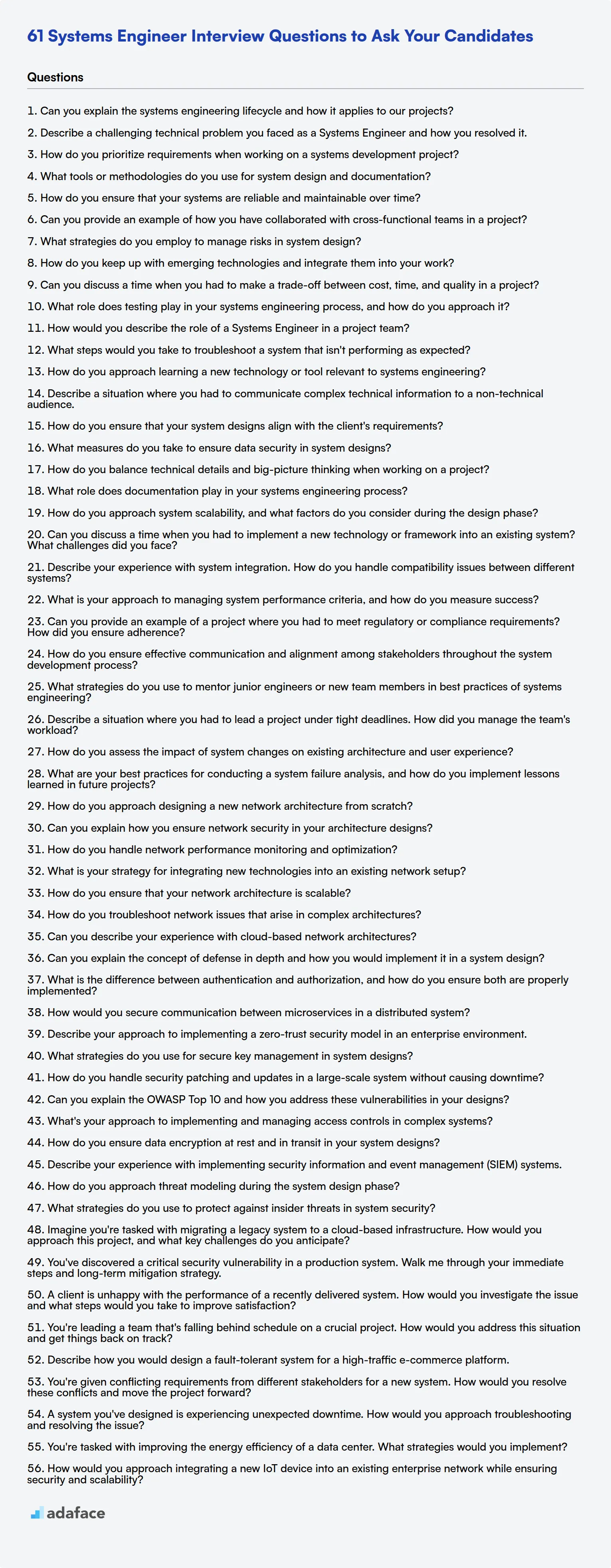Hiring the right Systems Engineer is crucial for maintaining robust IT infrastructure and ensuring smooth operations. Asking the right interview questions helps you identify candidates with the necessary technical expertise, problem-solving skills, and ability to manage complex systems.
This blog post provides a comprehensive list of Systems Engineer interview questions, covering various aspects of the role. We've organized the questions into categories, including common questions, junior-level questions, advanced questions for senior engineers, network architecture, system security, and situational questions.
By using these questions, you can effectively assess candidates' knowledge and capabilities in Systems Engineering. Consider combining these interview questions with a pre-employment assessment to thoroughly evaluate candidates' skills before the interview stage.
Table of contents
10 common Systems Engineer interview questions to ask your candidates
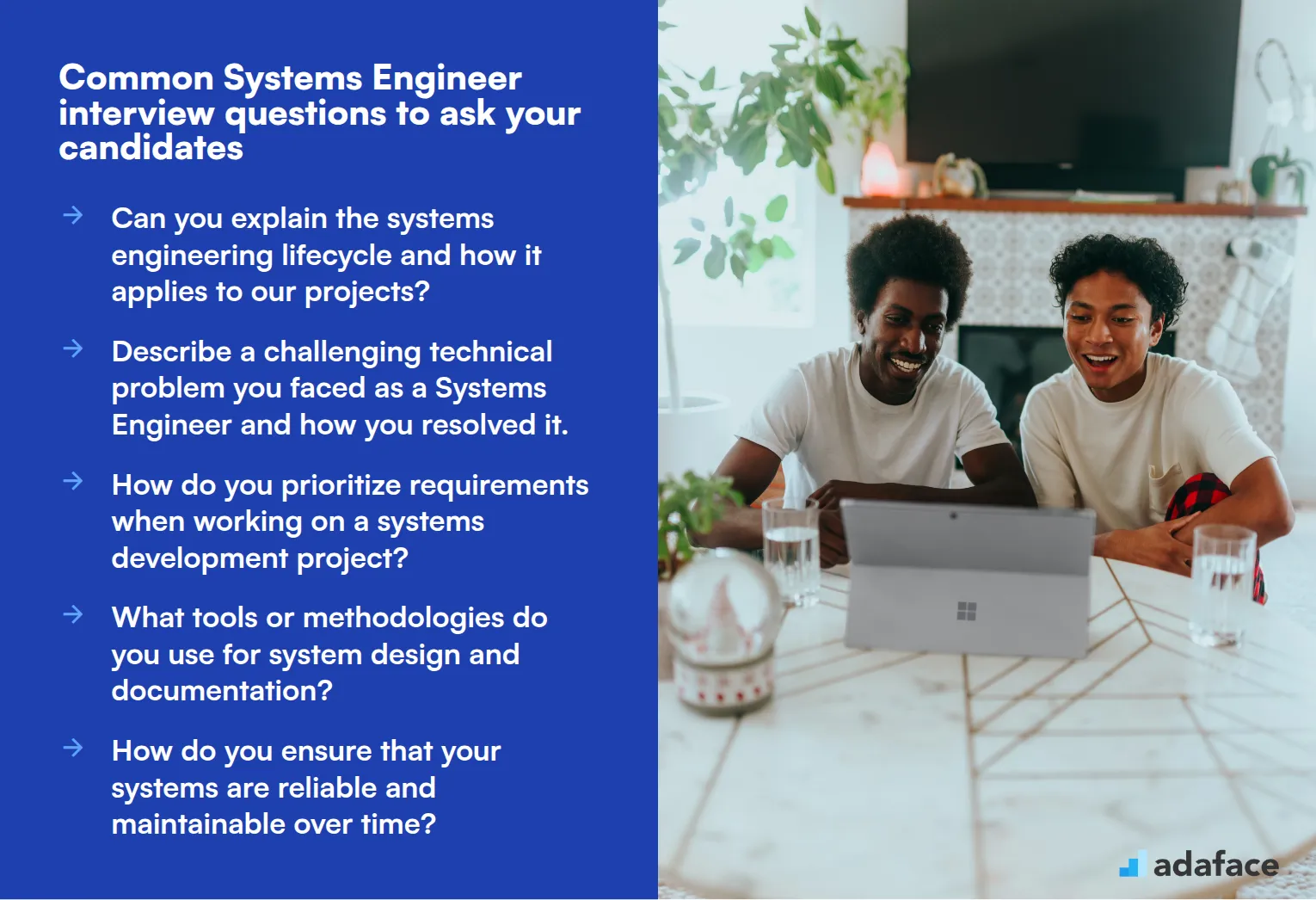
Using this list of questions can help you identify whether candidates possess the necessary skills and knowledge for the Systems Engineer role. Tailor these inquiries to gauge their technical capabilities, problem-solving approaches, and teamwork skills, ensuring a comprehensive evaluation. For a deeper understanding of the role, refer to our Systems Engineer job description.
- Can you explain the systems engineering lifecycle and how it applies to our projects?
- Describe a challenging technical problem you faced as a Systems Engineer and how you resolved it.
- How do you prioritize requirements when working on a systems development project?
- What tools or methodologies do you use for system design and documentation?
- How do you ensure that your systems are reliable and maintainable over time?
- Can you provide an example of how you have collaborated with cross-functional teams in a project?
- What strategies do you employ to manage risks in system design?
- How do you keep up with emerging technologies and integrate them into your work?
- Can you discuss a time when you had to make a trade-off between cost, time, and quality in a project?
- What role does testing play in your systems engineering process, and how do you approach it?
8 Systems Engineer interview questions and answers to evaluate junior engineers
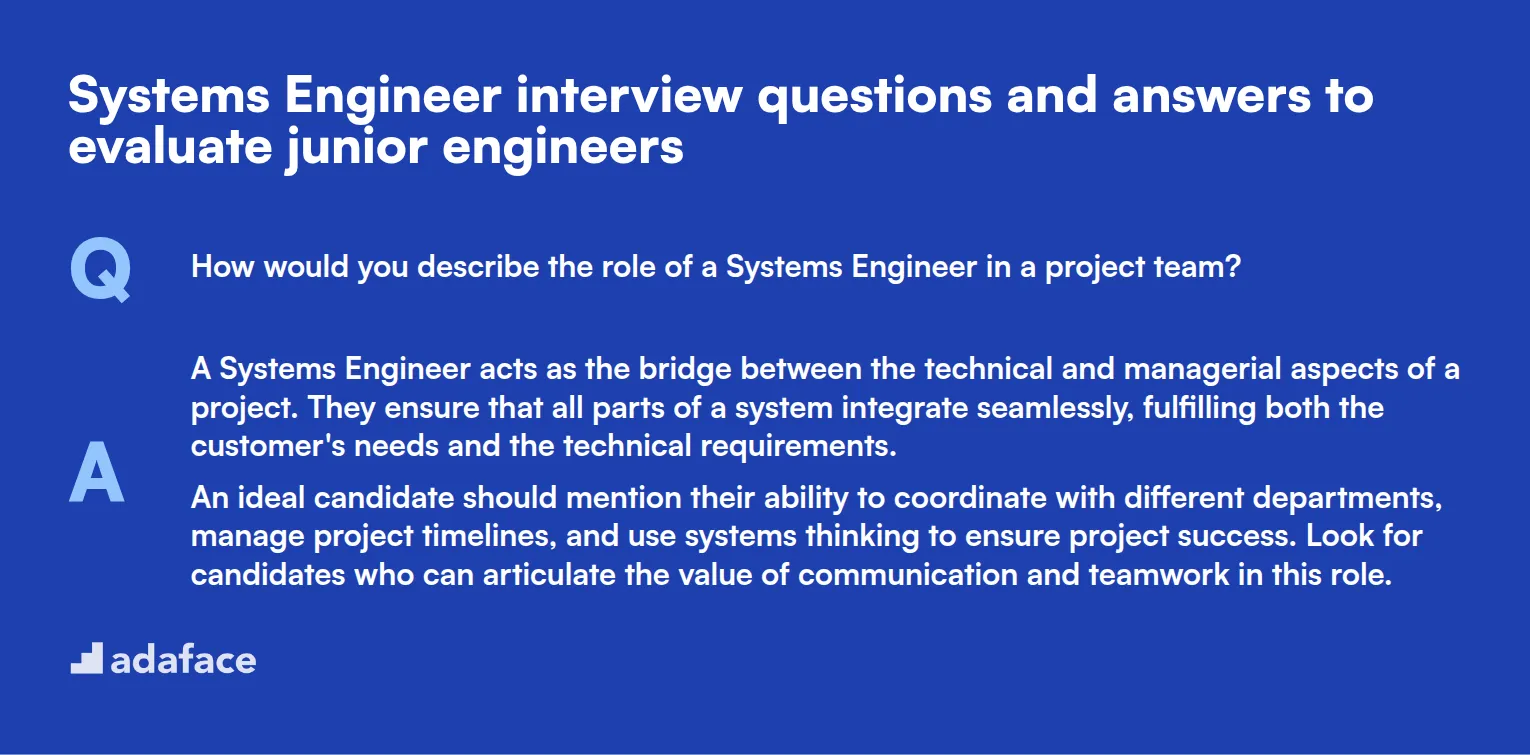
To make sure you're hiring a junior Systems Engineer with the right mix of technical know-how and soft skills, these questions can be your secret weapon. They help you identify candidates who have the potential to grow into a vital asset for your team. Use them during interviews to gauge not just knowledge, but also how candidates think and solve problems.
1. How would you describe the role of a Systems Engineer in a project team?
A Systems Engineer acts as the bridge between the technical and managerial aspects of a project. They ensure that all parts of a system integrate seamlessly, fulfilling both the customer's needs and the technical requirements.
An ideal candidate should mention their ability to coordinate with different departments, manage project timelines, and use systems thinking to ensure project success. Look for candidates who can articulate the value of communication and teamwork in this role.
2. What steps would you take to troubleshoot a system that isn't performing as expected?
Troubleshooting involves a methodical approach to identify the root cause of the issue. Start by collecting data about the problem, then verify and analyze that data to pinpoint the exact issue. Once identified, implement a solution and monitor the system to ensure the problem is resolved.
Candidates should discuss their ability to remain calm under pressure and their problem-solving skills. They might also mention using diagnostic tools and collaborating with other team members to resolve the issue efficiently. An ideal response would include a real-world example of troubleshooting.
3. How do you approach learning a new technology or tool relevant to systems engineering?
The key to learning new technology is staying curious and open-minded. Start by understanding the foundational concepts, then use hands-on practice to build your skills. Online courses, tutorials, and community forums can be invaluable resources.
Look for candidates who have a structured approach to learning and can demonstrate self-motivation. They should ideally share examples of how they've applied new skills to real-world projects. Mentioning resources like the skills required for Systems Engineers could indicate a proactive learning attitude.
4. Describe a situation where you had to communicate complex technical information to a non-technical audience.
Communicating technical information to a non-technical audience requires simplifying the concepts without losing their essence. Use analogies or visual aids to make the information more relatable and ensure that your audience can grasp the key points.
Candidates should demonstrate their ability to tailor their communication style to suit their audience. Look for examples of past experiences where their communication made a significant impact or influenced decision-making.
5. How do you ensure that your system designs align with the client's requirements?
Ensuring alignment with client requirements starts with thorough requirement gathering and validation. Engage in active dialogue with clients to understand their needs and use that information to guide the design process. Regular feedback loops with the client are essential to stay aligned.
Ideal candidates should stress the importance of documentation and client communication. Look for examples where they successfully managed client expectations and delivered a system that met or exceeded requirements.
6. What measures do you take to ensure data security in system designs?
Data security is paramount in system design. Measures include implementing encryption, access controls, and regular security audits. It's also crucial to stay updated with the latest security protocols and threats.
Candidates should demonstrate an understanding of the importance of security in system design and share specific practices they follow. An ideal response might include their experience with a security breach and how they addressed it.
7. How do you balance technical details and big-picture thinking when working on a project?
Balancing technical details with big-picture thinking involves maintaining a dual focus. Start by understanding the overall project goals and then dive into the technical specifics that will help achieve those goals. Regularly revisit the big picture to ensure alignment with project objectives.
Candidates should illustrate their ability to switch between detail-oriented and strategic thinking. Look for experiences where they successfully managed both perspectives to deliver project outcomes.
8. What role does documentation play in your systems engineering process?
Documentation is critical in systems engineering as it serves as a reference for current and future work. It ensures clarity, maintains consistency, and supports effective communication among team members and stakeholders.
Candidates should highlight their experience in creating and maintaining comprehensive documentation. They should understand its importance in troubleshooting, onboarding new team members, and ensuring project continuity.
15 advanced Systems Engineer interview questions to ask senior engineers
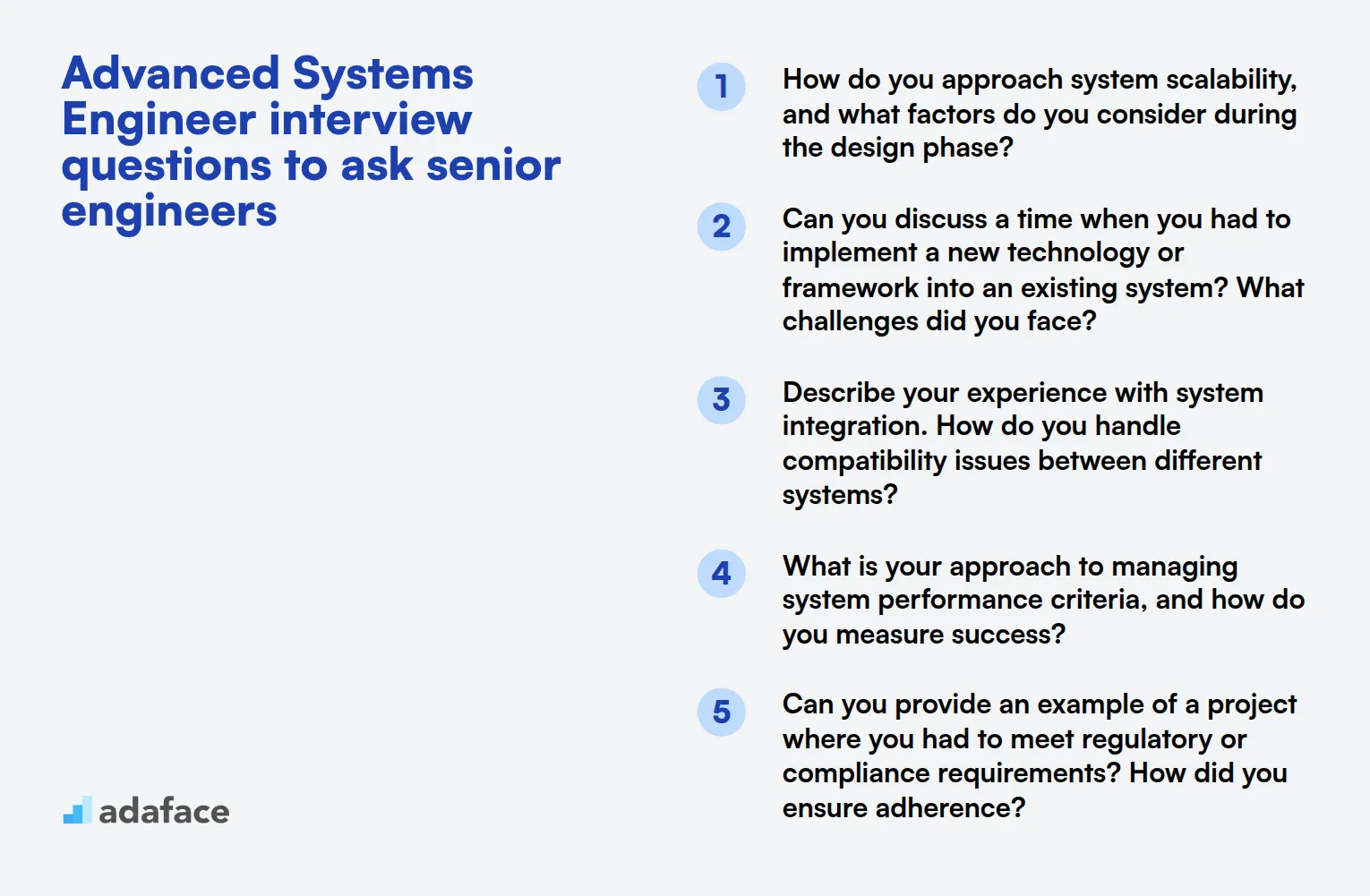
To gauge the expertise and problem-solving abilities of senior Systems Engineer candidates, use these advanced interview questions. They delve into complex scenarios and technical challenges, ensuring you assess the depth of their knowledge. For a comprehensive understanding of the role, refer to this Systems Engineer job description.
- How do you approach system scalability, and what factors do you consider during the design phase?
- Can you discuss a time when you had to implement a new technology or framework into an existing system? What challenges did you face?
- Describe your experience with system integration. How do you handle compatibility issues between different systems?
- What is your approach to managing system performance criteria, and how do you measure success?
- Can you provide an example of a project where you had to meet regulatory or compliance requirements? How did you ensure adherence?
- How do you ensure effective communication and alignment among stakeholders throughout the system development process?
- What strategies do you use to mentor junior engineers or new team members in best practices of systems engineering?
- Describe a situation where you had to lead a project under tight deadlines. How did you manage the team's workload?
- How do you assess the impact of system changes on existing architecture and user experience?
- What are your best practices for conducting a system failure analysis, and how do you implement lessons learned in future projects?
7 Systems Engineer interview questions and answers related to network architecture
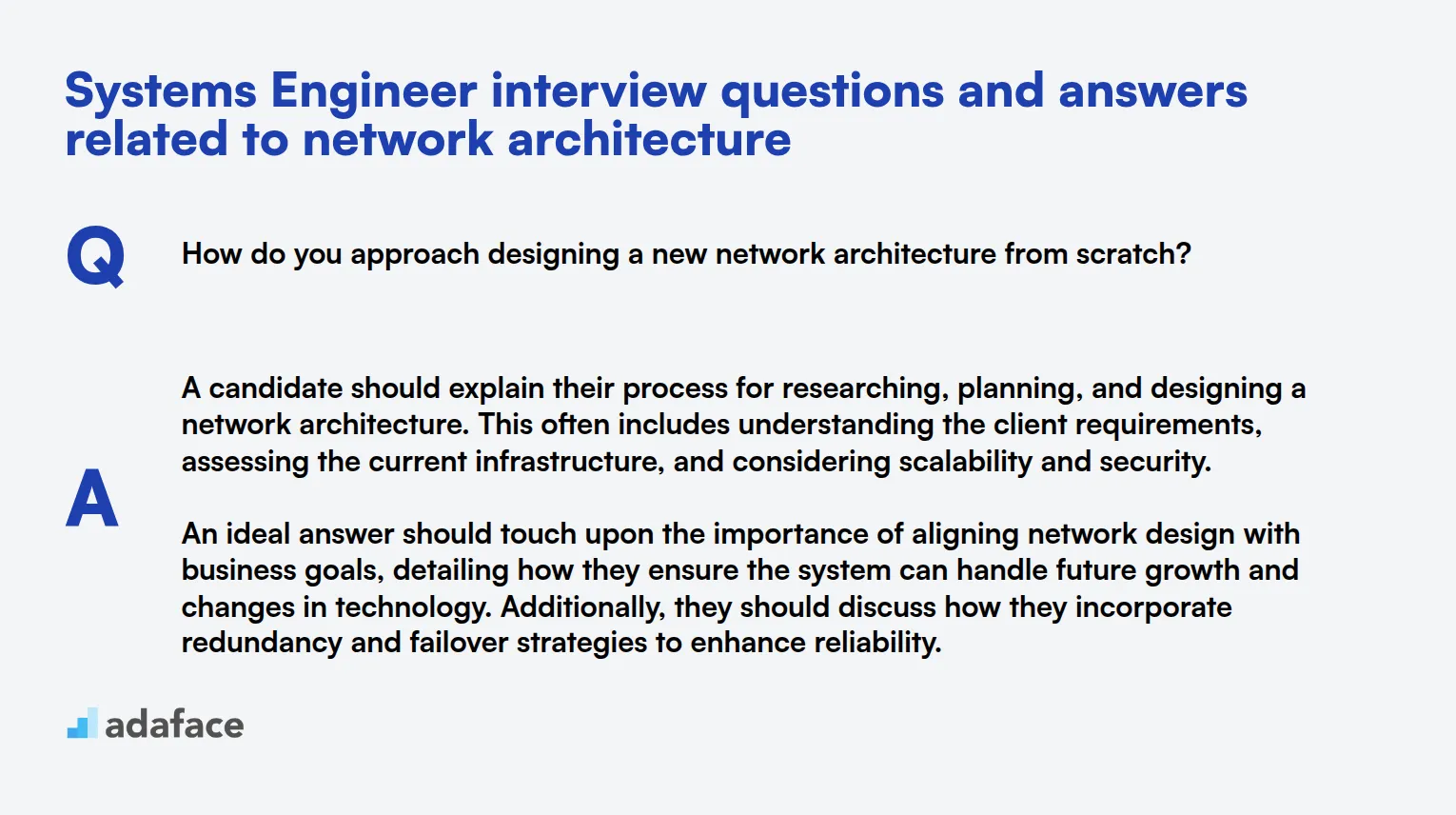
When it comes to evaluating a candidate's grasp on network architecture, having the right questions in your arsenal is key. These questions are designed to assess the candidate's understanding of network intricacies and their ability to design robust systems. Perfect for interviews when you're looking to dive deeper into network architecture skills!
1. How do you approach designing a new network architecture from scratch?
A candidate should explain their process for researching, planning, and designing a network architecture. This often includes understanding the client requirements, assessing the current infrastructure, and considering scalability and security.
An ideal answer should touch upon the importance of aligning network design with business goals, detailing how they ensure the system can handle future growth and changes in technology. Additionally, they should discuss how they incorporate redundancy and failover strategies to enhance reliability.
2. Can you explain how you ensure network security in your architecture designs?
Ensuring network security involves implementing a multi-layered approach, including firewalls, intrusion detection systems, and encrypted connections.
Candidates should highlight their experience with implementing security protocols and their approach to regularly updating and patching network systems to protect against vulnerabilities. They should also mention how they stay informed about the latest security threats and trends.
Look for candidates who emphasize the importance of security by design and who demonstrate a proactive approach to safeguarding network architecture.
3. How do you handle network performance monitoring and optimization?
Candidates should describe their methods for continuously monitoring network performance, such as using analytics tools and setting performance benchmarks.
An effective answer should include examples of how they identify bottlenecks and implement solutions to enhance speed and reliability. They might also discuss the role of network configuration and upgrades in optimization.
The ideal response will demonstrate a proactive approach to performance management and a thorough understanding of the tools and techniques used in monitoring and optimization.
4. What is your strategy for integrating new technologies into an existing network setup?
Integrating new technology requires careful planning and testing. Candidates should discuss their approach to evaluating new technologies, understanding compatibility issues, and conducting pilot tests before full integration.
A strong candidate will mention their experience with phased rollouts and how they handle potential disruptions during integration. They should also reference their ability to collaborate with cross-functional teams to ensure a smooth transition.
Look for responses that show a balanced approach between innovation and stability, ensuring minimal disruption to the existing network while integrating new solutions.
5. How do you ensure that your network architecture is scalable?
Scalability is crucial for accommodating growth. Candidates should discuss their approach to designing flexible networks that can expand without significant redesign.
They should explain how they plan for scalability during the initial design phase, including considering future bandwidth needs and potential increases in connected devices.
The ideal answer will showcase an understanding of modular design principles and the ability to foresee and plan for future network demands.
6. How do you troubleshoot network issues that arise in complex architectures?
Troubleshooting requires a systematic approach. Candidates should explain their process for identifying and resolving network issues, including using diagnostic tools and logs to pinpoint problems.
A strong answer will demonstrate experience in quick problem-solving and an understanding of how to prioritize issues based on impact and severity. They should also mention their communication skills when liaising with stakeholders during critical outages.
Look for candidates who emphasize a logical and thorough troubleshooting process, with examples of past challenges they successfully resolved.
7. Can you describe your experience with cloud-based network architectures?
Cloud-based architectures require a specific set of skills. Candidates should detail their experience with cloud providers and how they design networks to operate efficiently in a cloud environment.
An ideal response will include examples of successfully implemented cloud solutions, discussing the challenges faced and how they were overcome—perhaps referencing skills required for cloud engineers.
Seek candidates who demonstrate a deep understanding of cloud services, integration strategies, and cost optimization in cloud architectures.
12 Systems Engineer interview questions about system security protocols
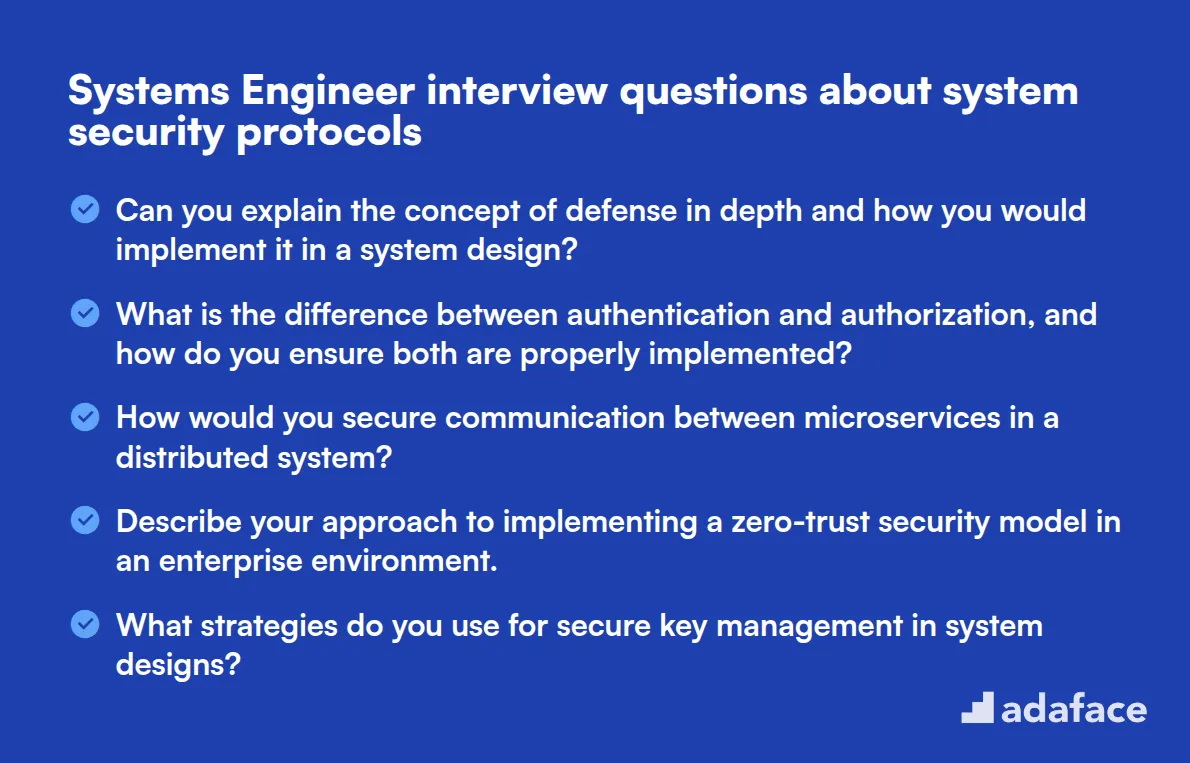
To assess a candidate's expertise in system security protocols, use these 12 interview questions. They will help you evaluate the applicant's knowledge of security measures, threat mitigation strategies, and best practices for protecting critical systems and data.
- Can you explain the concept of defense in depth and how you would implement it in a system design?
- What is the difference between authentication and authorization, and how do you ensure both are properly implemented?
- How would you secure communication between microservices in a distributed system?
- Describe your approach to implementing a zero-trust security model in an enterprise environment.
- What strategies do you use for secure key management in system designs?
- How do you handle security patching and updates in a large-scale system without causing downtime?
- Can you explain the OWASP Top 10 and how you address these vulnerabilities in your designs?
- What's your approach to implementing and managing access controls in complex systems?
- How do you ensure data encryption at rest and in transit in your system designs?
- Describe your experience with implementing security information and event management (SIEM) systems.
- How do you approach threat modeling during the system design phase?
- What strategies do you use to protect against insider threats in system security?
9 situational Systems Engineer interview questions for hiring top engineers
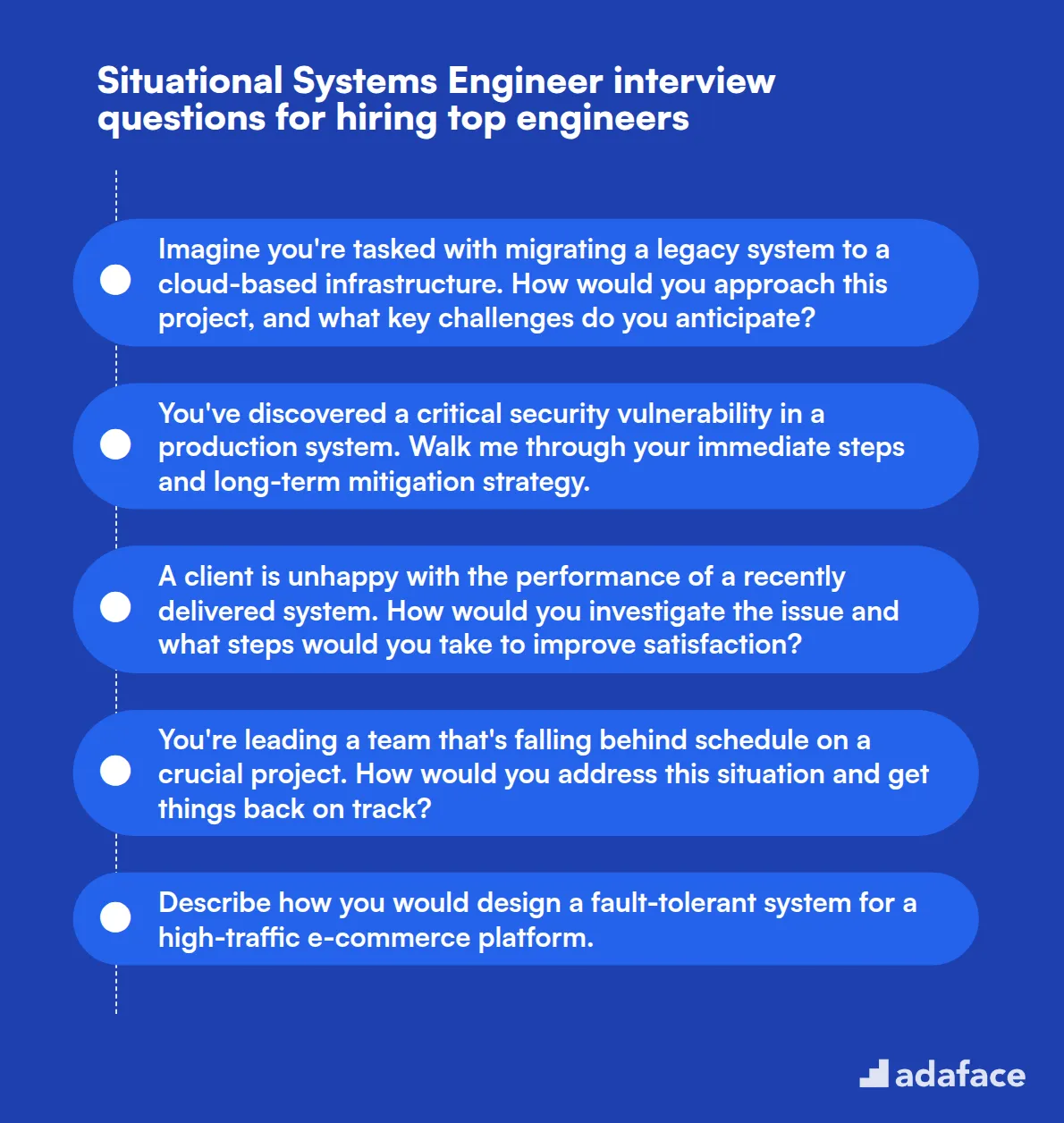
To assess a candidate's ability to handle real-world scenarios, use these situational Systems Engineer interview questions. These questions help evaluate problem-solving skills, adaptability, and technical expertise in practical contexts.
- Imagine you're tasked with migrating a legacy system to a cloud-based infrastructure. How would you approach this project, and what key challenges do you anticipate?
- You've discovered a critical security vulnerability in a production system. Walk me through your immediate steps and long-term mitigation strategy.
- A client is unhappy with the performance of a recently delivered system. How would you investigate the issue and what steps would you take to improve satisfaction?
- You're leading a team that's falling behind schedule on a crucial project. How would you address this situation and get things back on track?
- Describe how you would design a fault-tolerant system for a high-traffic e-commerce platform.
- You're given conflicting requirements from different stakeholders for a new system. How would you resolve these conflicts and move the project forward?
- A system you've designed is experiencing unexpected downtime. How would you approach troubleshooting and resolving the issue?
- You're tasked with improving the energy efficiency of a data center. What strategies would you implement?
- How would you approach integrating a new IoT device into an existing enterprise network while ensuring security and scalability?
Which Systems Engineer skills should you evaluate during the interview phase?
While it's impossible to assess every aspect of a candidate's suitability for a Systems Engineer role in a single interview, focusing on key skills can provide valuable insights. These core competencies are essential for evaluating whether a candidate has the right mix of technical and interpersonal abilities needed to excel in this position.
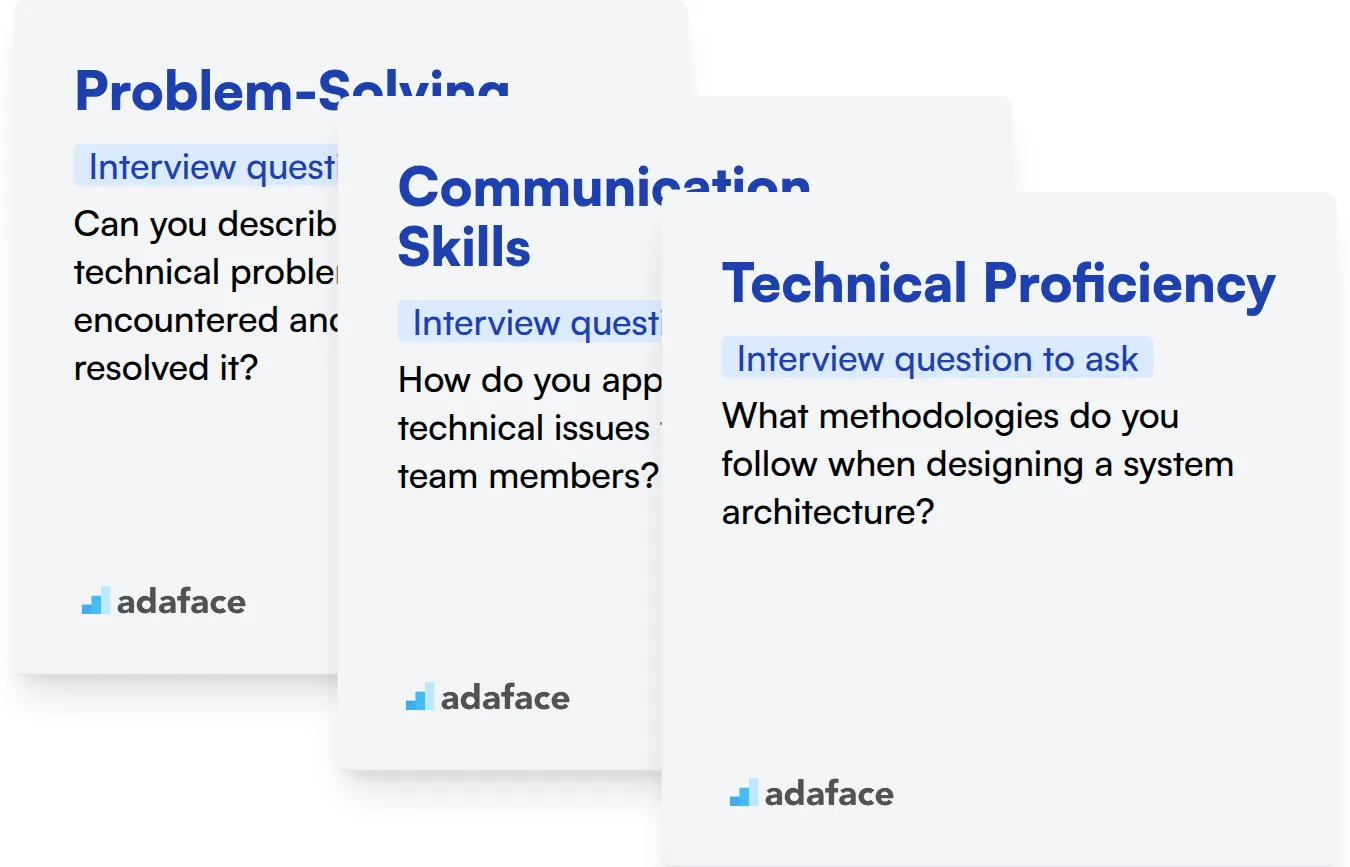
Problem-Solving
To filter for problem-solving skills, consider using an assessment test that includes relevant multiple-choice questions. These can effectively gauge a candidate's analytical and critical thinking abilities, ensuring you find the right fit for your team.
Additionally, asking targeted interview questions can help you assess this skill deep within the candidate. For instance, you might consider the following question:
Can you describe a challenging technical problem you encountered and how you resolved it?
When asking this question, look for a structured approach to problem-solving. Candidates should explain their thought process, the steps they took to investigate the issue, and the outcome, demonstrating their ability to tackle challenges effectively.
Communication Skills
To evaluate communication skills, you might use an assessment that includes relevant MCQs. Consider tests focusing on verbal reasoning and comprehension to help identify candidates who can articulate their thoughts clearly.
You can also assess communication during the interview by asking specific questions. One effective question is:
How do you approach explaining technical issues to non-technical team members?
Look for answers that highlight clarity and simplicity in communication. Candidates should demonstrate an understanding of their audience and provide examples of how they have tailored their communication style accordingly.
Technical Proficiency
To effectively assess technical proficiency, consider implementing an online test that includes multiple-choice questions aligned with the technologies your organization uses. These tests can help narrow down candidates with the necessary technical expertise.
In addition to tests, you might ask candidates specific technical questions during the interview. For example:
What methodologies do you follow when designing a system architecture?
When candidates respond, observe their familiarity with industry standards and practices, as well as their ability to critically evaluate different approaches based on project requirements.
Streamline Your Systems Engineer Hiring Process with Skills Tests and Targeted Questions
When hiring a Systems Engineer, it's important to accurately assess their technical skills. This ensures you find candidates who can handle the job's demands and contribute to your team's success.
One effective way to evaluate these skills is through online assessments. Our System Administration Test and Cloud Computing Test can help you gauge candidates' knowledge in key areas.
After using these tests to shortlist top applicants, you can invite them for interviews. This two-step process allows you to focus on the most promising candidates, saving time and resources.
Ready to improve your hiring process? Sign up for Adaface to access our comprehensive test library and start finding the best Systems Engineers for your team.
Jenkins & Ansible Online Test
Download Systems Engineer interview questions template in multiple formats
Systems Engineer Interview Questions FAQs
A Systems Engineer designs, integrates, and manages complex systems over their life cycles, often focusing on both the hardware and software components.
Assess their technical expertise, problem-solving abilities, and understanding of system architecture and security protocols through targeted questions.
They should have strong analytical, problem-solving, and technical skills, along with experience in network architecture and system security.
They help evaluate how candidates handle real-world challenges by understanding their thought processes and problem-solving methods.
A great Systems Engineer combines technical expertise with strong communication skills and a collaborative approach to problem-solving.
Skills tests provide objective data on candidates’ technical abilities, complementing interview insights to make informed hiring decisions.

40 min skill tests.
No trick questions.
Accurate shortlisting.
We make it easy for you to find the best candidates in your pipeline with a 40 min skills test.
Try for freeRelated posts
Free resources




